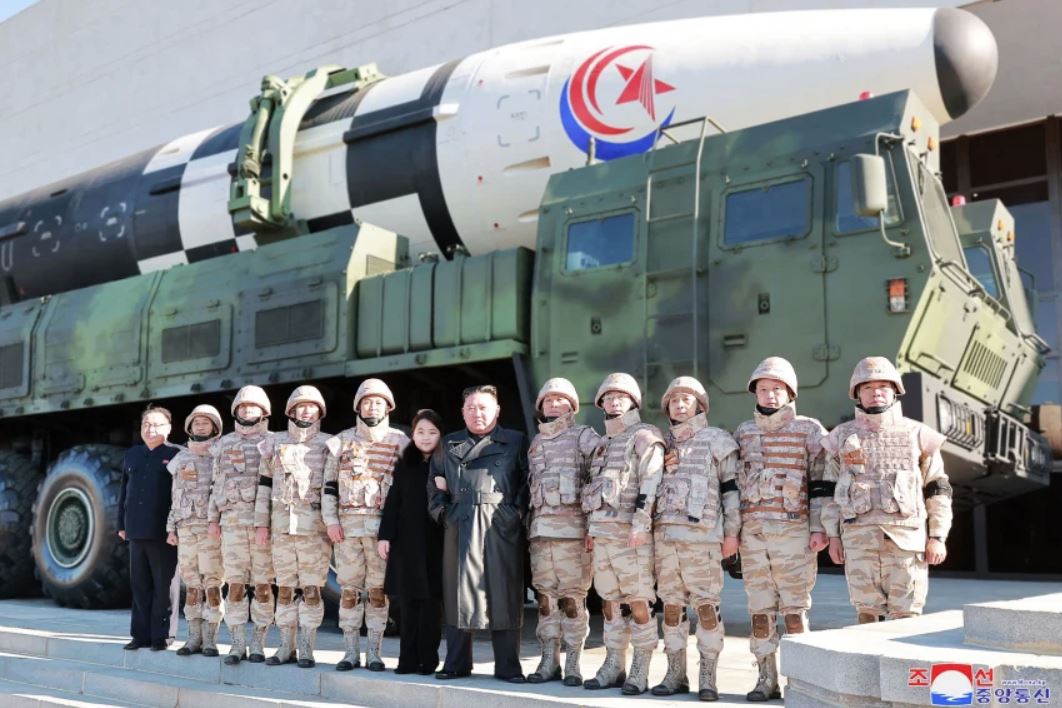
By Soyoung Kim and Heekyong Yang
SEOUL (Reuters) – Two American B-1B heavy bombers joined large-scale combat drills over South Korea on Thursday amid warnings from North Korea that the exercises and U.S. threats have made the outbreak of war “an established fact”.
The annual U.S.-South Korean “Vigilant Ace” exercises feature 230 aircraft, including a range of the U.S. military’s most advanced stealth warplanes, and come a week after North Korea tested its most powerful intercontinental ballistic missile (ICBM) to date which it says can reach the mainland United States.
A spokesman for the North’s foreign ministry blamed the drills and “confrontational warmongering” by U.S. officials for making war inevitable.
“The remaining question now is: when will the war break out?” the spokesman said late on Wednesday in a statement carried by North Korea’s official KCNA news agency.
“We do not wish for a war but shall not hide from it.”
China, North Korea’s neighbor and lone major ally, again urged calm and said war was not the answer.
“We hope all relevant parties can maintain calm and restraint and take steps to alleviate tensions and not provoke each other,” Chinese Foreign Ministry spokesman Geng Shuang said in a statement.
“The outbreak of war is not in any side’s interest. The ones that will suffer the most are ordinary people.”
Tensions on the Korean peninsula have risen markedly in recent months after North Korea’s latest missile and nuclear tests, conducted in defiance of U.N. Security Council resolutions and international condemnation.
STRATEGIC BOMBERS
On Wednesday, a U.S. B-1B bomber flew from the Pacific U.S.-administered territory of Guam to join the exercises, which will run until Friday.
The flights by the B-1B, one of America’s largest strike aircraft, have played a leading role in Washington’s attempts to increase pressure on North Korea to abandon its weapons program.
In September, B-1Bs were among a formation of U.S. military aircraft that flew further north up North Korea’s coast than at any time in the past 17 years, according to the U.S. Pacific Command.
That prompted North Korea’s foreign minister, Ri Yong Ho, to warn that the North could shoot down the U.S. bombers even if they did not enter North Korean airspace.
“B1-B bombers have been regularly dispatched to the Korean peninsula over the past years; however, it seems that the U.S. Air Force might have enhanced its training to better prepare for actual warfare,” said Yang Uk, a senior fellow at the Korea Defence and Security Forum.
While B-1Bs are no longer equipped to carry nuclear weapons of their own, they would be key to any strike targeting major North Korean facilities, he said.
“That’s why North Korea has been making such a big deal when B1-B bombers are flying overhead.”
ESCALATING TENSIONS
Both sides insist they don’t want war, but blame each other for provocations while saying they will act to defend themselves.
White House national security adviser H.R. McMaster said over the weekend that the possibility of war with North Korea was “increasing every day”.
U.S. Republican Senator Lindsey Graham urged the Pentagon on Sunday to start moving U.S. military dependants, such as spouses and children, out of South Korea, saying conflict with North Korea was getting close.
The Pentagon said it has “no intent” to move any dependants out of the country.
North Korea regularly threatens to destroy South Korea and the United States and says its weapons program are necessary to counter U.S. aggression. The United States stations 28,500 troops in the South, a legacy of the 1950-53 Korean War.
“Recently, as the U.S. is conducting the largest-ever joint aerial drill on the Korean peninsula targeting the Democratic People’s Republic of Korea, its high-level politicians are showing alarming signs by making bellicose remarks one after another,” the North’s foreign ministry spokesman said, using North Korea’s official name.
“These confrontational war-mongering remarks cannot be interpreted in any other way but as a warning to us to be prepared for a war on the Korean peninsula,” he said.
North Korea’s latest missile test prompted a warning from the United States that North Korea’s leadership would be “utterly destroyed” if war were to break out, a statement that drew sharp criticism from Russia.
U.S. President Donald Trump has said the whole of North Korea would be destroyed in the event of war.
The rising tensions coincide with a rare visit to the isolated North by United Nations political affairs chief Jeffrey Feltman this week, the highest-level U.N. official to visit North Korea since 2012.
Feltman met North Korean Foreign Minister Ri on Thursday, following his meeting with the vice foreign minister a day earlier, KCNA said.
(Additional reporting by Hyonhee Shin and Josh Smith in Seoul and Christian Shepherd in Beijing; Editing by Nick Macfie)












